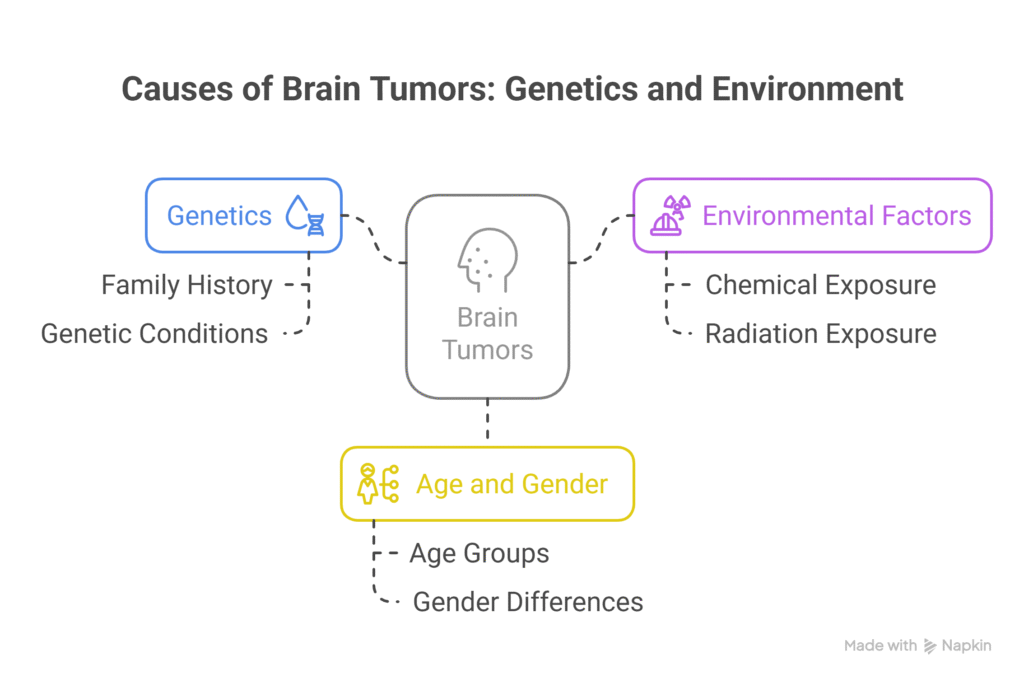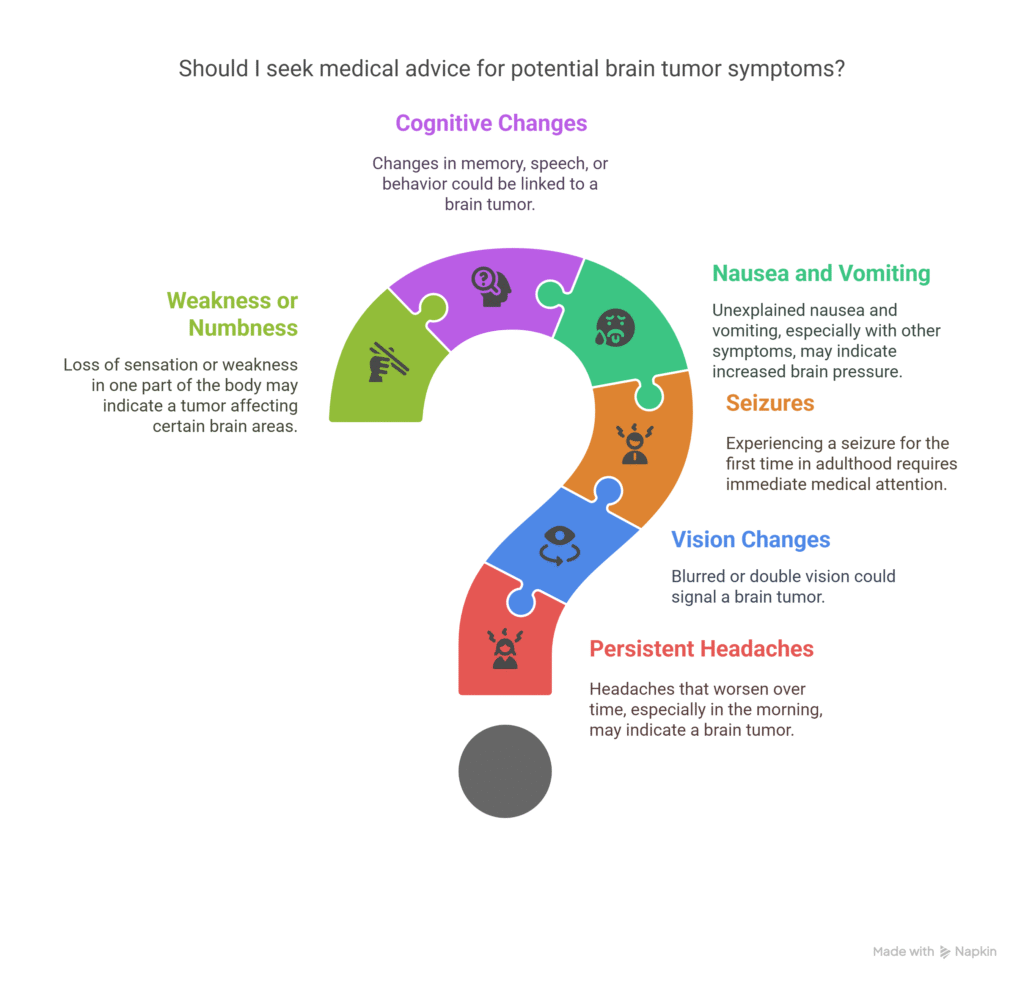It’s no secret that stress and overthinking can feel overwhelming. The constant swirl of thoughts, worries, and anxieties often leads us to wonder about their impact on our health. One common concern that often arises is: Can overthinking cause brain tumors? Many people, after experiencing long periods of stress or anxiety, start to worry that their mental state could lead to something as serious as a brain tumor. But how true is this belief?

In this blog, we will dive into the myths and facts surrounding this question, clarifying the connection (or lack thereof) between overthinking and brain tumors. We’ll also touch on the importance of seeking professional help when it comes to any concerns related to brain health. Dr. Arun Saroha, a renowned neurosurgeon, specializes in diagnosing and treating brain-related conditions, and he can help clarify any questions regarding brain tumors.
Myth 1: Overthinking Causes Brain Tumors
Let’s start with the most common myth: can overthinking cause brain tumors? The simple answer is no. Overthinking, while it can certainly lead to anxiety and stress, does not cause brain tumors.
Brain tumors develop when abnormal cells in the brain grow uncontrollably. While we don’t fully understand all the causes of brain tumors, they are not linked to the amount of thinking you do. In fact, brain tumors are typically the result of genetic mutations, environmental factors, or other medical conditions—not stress or mental strain.
So, if you find yourself wondering if overthinking could cause brain tumors, rest assured that it is not a direct cause. However, chronic stress from overthinking can certainly have other effects on your health, such as high blood pressure, sleep problems, and mental fatigue, but not tumors.
Fact 1: Genetics and Environmental Factors Are the Main Causes of Brain Tumors

When it comes to the question, can overthinking cause brain tumors, the key takeaway is that genetics and environmental factors are the primary contributors to the development of brain tumors. While stress and overthinking don’t directly lead to brain tumors, there are a few factors that might:
- Genetic predisposition: If you have a family history of brain tumors, your risk of developing one may be higher. Certain genetic conditions, such as neurofibromatosis, can also increase the risk of brain tumors.
- Environmental factors: Exposure to certain chemicals, radiation, or harmful substances may increase the likelihood of developing brain tumors. For example, people who have been exposed to significant amounts of radiation in childhood may have a higher risk of developing brain tumors later in life.
- Age and gender: Some types of brain tumors are more common in certain age groups or genders. For instance, glioblastomas are more common in older adults, while medulloblastomas are more often diagnosed in children.
If you are concerned about your genetic risk or environmental exposures, talking to a healthcare professional like Dr. Arun Saroha can help you assess your risk factors and take preventive steps.
Myth 2: Stress Can Lead to Brain Tumors
This myth often stems from the belief that stress and anxiety cause serious physical conditions, including brain tumors. While stress and anxiety are undoubtedly harmful in many ways, including weakening the immune system, they are not known to cause tumors in the brain.
That being said, chronic stress can contribute to physical health problems. When stressed, the body releases chemicals like cortisol, which, in high levels over extended periods, can lead to various health issues like heart disease, digestive issues, and high blood pressure. But there is no scientific evidence to support the idea that stress directly causes the growth of brain tumors.
If you are constantly overthinking and feeling stressed, it’s important to find healthy ways to manage your emotions. Techniques like meditation, yoga, physical exercise, and talking to a mental health professional can help reduce stress and prevent its negative impact on your body.
Fact 2: Symptoms of Brain Tumors and How to Recognize Them

While overthinking cannot cause brain tumors, it’s important to be aware of the symptoms of a brain tumor so that you can seek medical help promptly if necessary. Common symptoms include:
- Persistent headaches: Headaches that worsen over time, especially in the morning, may indicate a brain tumor. These headaches are often different from your usual headaches and can be severe.
- Vision changes: Blurred vision, double vision, or other vision problems could signal a brain tumor.
- Seizures: If you experience a seizure for the first time in adulthood, it’s crucial to get medical attention immediately.
- Nausea and vomiting: Unexplained nausea and vomiting, especially when combined with other symptoms, may be a sign of increased pressure in the brain due to a tumor.
- Cognitive or personality changes: If you notice changes in your memory, speech, or behavior, it could be linked to a brain tumor.
- Weakness or numbness: Loss of sensation or weakness in one part of the body may indicate that a tumor is affecting certain areas of the brain.
It’s important to keep in mind that these symptoms can also be caused by many other conditions, not just brain tumors. If you experience any of these symptoms, don’t panic, but seek medical advice as soon as possible. Dr. Arun Saroha, with his expertise in neurosurgery, can help determine the cause of your symptoms and recommend appropriate treatment.
Myth 3: Brain Tumors Are Always Fatal
Another common myth is that brain tumors are always fatal. The reality is much more nuanced. While brain tumors can be life-threatening in some cases, many types of brain tumors are treatable, and patients can live with them for many years.
The prognosis for a person with a brain tumor largely depends on the type of tumor, its size, location, and how early it is diagnosed. Some tumors are benign (non-cancerous), and with proper treatment, patients can go on to lead a normal life.
On the other hand, malignant (cancerous) brain tumors are more serious and require aggressive treatment, but even then, medical advancements in neurosurgery, radiation, and chemotherapy have made it possible for many people to survive and thrive after brain tumor treatment.
Dr. Arun Saroha, a leading neurosurgeon, specializes in diagnosing and treating brain tumors and can provide personalized care and treatment for those affected by these conditions. If you have concerns or experience any symptoms related to brain health, it’s important to seek professional guidance early.
Fact 3: Overthinking Can Affect Your Mental Health
While overthinking doesn’t cause brain tumors, it can certainly affect your mental and emotional well-being. Constantly dwelling on thoughts, anxieties, and worries can lead to conditions like stress, anxiety, and depression. These mental health challenges can have a significant impact on your quality of life and may even contribute to physical symptoms, including headaches and muscle tension, but not brain tumors.
Managing your mental health is key to overall wellness. Speaking with a mental health professional, practicing relaxation techniques, and making lifestyle changes can help reduce the impact of overthinking and improve your emotional well-being.
Conclusion: Can Overthinking Cause Brain Tumors?
In conclusion, can overthinking cause brain tumors? The answer is no. Overthinking does not directly cause brain tumors, but it can certainly contribute to stress and anxiety, which may lead to other physical and mental health issues. Brain tumors, on the other hand, are primarily caused by genetic factors, environmental influences, or other medical conditions.
If you’re concerned about brain health or have noticed any symptoms of a brain tumor, it’s important to seek professional help. Dr. Arun Saroha, a top neurosurgeon, specializes in diagnosing and treating brain-related conditions and can provide the expert care you need.
It’s crucial to separate myths from facts and understand the real causes of brain tumors. If you find yourself constantly overthinking, try to find ways to manage stress through relaxation techniques, exercise, and talking to a professional. Your mental health matters, and taking steps to improve it can go a long way in preventing the harmful effects of stress on your body and mind.
Need Help? Reach Out Today
Contact Now!
Make An Appointment
If you have concerns about brain tumors or your brain health, don’t hesitate to consult with Dr. Arun Saroha for a comprehensive evaluation and peace of mind.
FAQs – Brain Tumors Explained
What is the main cause of brain tumors?
A: Brain tumors can develop due to genetic mutations, exposure to radiation, or a family history. In many cases, the exact cause remains unknown.
Can too much overthinking cause brain damage?
Overthinking alone doesn’t cause brain damage, but chronic stress can affect brain function and may contribute to mental health issues.
Can a brain tumor be cured?
Some brain tumors can be cured, especially if detected early and treated with surgery, radiation, or chemotherapy, depending on the type.









